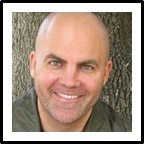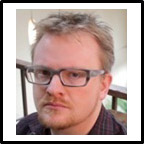World's Gone Zombie
Raising the Undead: Zombie Popularity and Prevailing Theory
In the last half decade, zombie popularity has spread like a pandemic. As zombie interest hits a fever-pitch, HalloweenCostumes.com reached out to leading zombie experts Matt Mogk and Scott Kenemore to find out why.
Picking their brains on prevailing zombie theory, we've scoured the known 'zombie-verse' for explanations of the rising popularity of zombies in pop culture and the theoretical underpinnings of an actual zombie outbreak. As we make light of a scary situation; and as zombie costumes remain a quintessential Halloween costume year after year; the mercury continues to climb on the debate. Mogk and Kenemore share their insights on zombies in the 21st Century.
Meet Our Experts

Matt Mogk is a foremost global zombie expert and founder of the Zombie Research Society (ZRS), "a global community dedicated to the serious study of zombie science, survival and pop culture." Author of the non-fiction, Everything You Ever Wanted to Know About Zombies (2011), Mogk has appeared on Spike's Deadliest Warrior, National Geographic's The Truth Behind Zombies and AMC's Talking Dead (the live after-show of The Walking Dead). Mogk and the ZRS represent the meeting of the best and brightest in science, epidemiology, virology and zombology.

Scott Kenemore is a leading global zombie expert, member of the ZRS advisory board and a widely published novelist and zombie satirist. Some of Kenemore's eight books include The Zen of Zombie (2007), The Art of Zombie Warfare (2010) and Zombie, Ohio (2011). His latest novel, Zombie, Illinois, is also set to hit stores Oct. 1, 2012. With appearances on National Public Radio, the Fox News Channel, the Martha Stewart Living Radio and The Alan Colmes Show, and with mentions in the Chicago Tribune, the Huffington Post and the New York Times "City Room" blog, Kenemore is no stranger to the ever-growing world of the undead.
One Contagious Topic
The real question on everyone's tasty, scrumptious brain is why zombies, and why now? According to Mogk, the beating heart of the modern undead craze is rooted in three often intertwining insights:
Zombies are synonymous with the end of the world:
With global warming, thermonuclear war, biological warfare and every other walk of mass destruction on our collective mind, a zombie apocalypse emulates our most real and latent modern fears.
Zombies match our unromantic, post-modern world:
Simply put, since there is no "new frontier" (save arguably the depths of the ocean and outer space); zombies fit our "unromantic" paradigm nicely. Unlike charming vampires or glistening werewolves popularized in movies like the Twilight saga, zombies are gritty, unforgiving, uncompromising and as unromantic as they come. No magic here– just unrelenting, gnashing masses!
Zombies are inherently biological:
In an age of advanced medicine and microbiological sciences, zombies no longer require belief in mere superstition or myth. They don't require the same "suspension of disbelief" as paranormal creatures do to seem possible.
Kenemore adds a fourth piece to the puzzle, calling upon the inherent comedic nature of zombies.
"I like the idea of zombies as satirical," he says, "because of all the famous movie monsters we have in pop culture– Frankenstein, the Wolfman, vampires– zombies are the worst... There's almost no excuse for being eaten by a zombie. They're slow. They can't read. They can't communicate. When they work together and cooperate, it's accidental. Yet they always get their man." Can anyone one say, Shaun of the Dead?
It seems that whether a function of doomsday fears, our unromantic post-modern perspective, increased medical knowledge or sheer comedic draw, zombies clearly fit within the 21st Century perspective.
The Great Zombie Scare of 2012
In modern times, the zombie has taken on the face of a virus, bacteria, or biological man-made disaster. Popularized in films like 28 Days Later, Zombieland, Resident Evil, Dawn of the Dead and the hit TV series, The Walking Dead, zombies are a less jagged pill to swallow when underpinned by modern medical science.
"I think it depends on biotechnology." says Kenemore. "I would say the threat is higher than it's ever been. Let me put it that way. There's never been a time in history when the threat of something like this happening has ever been higher."
Consider the example of the May 26, 2012 "bath salts" incident in Miami, Florida. For those who've lived under a rock, Rudy Eugene, a 31-year-old Miami man attacked and ate the face of 65-year-old Ronald Poppo while under the influence of a synthetic stimulant cocktail, street named "bath salts."
In the weeks that followed, the internet was abuzz with talk of a man-made zombie outbreak. Once the dust settled and half-serious 'fears' of zombie outbreak dissolved, our fascination seemed to linger.
The question remains: How likely is an outbreak of a disease with symptoms similar to modern zombieism?
The 'Living' Dead
Mogk offers one example of a could-be precursor to the 'zombie bug' called variant Creutzfeldt-Jakob Disease (vCJD). Remember Mad Cow disease? Well vCJD is effectively "Mad Human."
In this scenario, the disease is transmitted between the living, rather than a "reanimation" situation. While Mogk was careful to say that vCJD is by no means the literal beginning of a zombie outbreak, he does find its biological implications troubling in terms of symptoms, transmutability, rapid and recent evolution and general affinities with a disease capable of creating a zombie-like scenario.
Caused by mutated brain proteins, the dreaded vCJD is a human prion disease of the central nervous system that may mark the first-ever prion disease to spread from animals to humans.1 Symptoms of vCJD include behavioral change, personality change, memory impairment and depression.2 Other sources point to delusions, hallucinations, and other neurological and psychiatric manifestations.3 When one thinks "zombie," all of these symptoms come to mind.
"Here’s the real problem," says Mogk. "The protein is dead. It's technically not alive. So it literally flies in the face of everything we understand about the potential for evolution. It makes as much sense as saying a pencil sitting on a table is going to grow legs and run away... Things [just] don't evolve that aren't alive."
Equally as perplexing is the protein's very recent leap in mutation after ages of remaining stagnant.
"The protein itself is evolving," says Mogk. "Now again, this is a protein that's been around forever... so why is it evolving in these past 10 or 15 years?"
Sounds eerie, no? If nothing else, take it as food for thought. Who really knows? Maybe one day it will come in handy if a zombie ever wants to take your thoughts for food.
![]()
2 R G Will, J W Ironside, M Zeidler, S N Cousens, K Estibeiro, A Alperovitch, S Poser, M Pocchiari, A Hofman, P G Smith, Lancet 1996; 347: 921-25 (link)
3 Bradley, Walter G. Daroff, Robert B. Fenichel, Gerald M. Jankovic, Joseph. Heinemann, Butterworth, Neurology in Clinical Practice: Principles of diagnosis and management 2004. Philadelphia, PA

